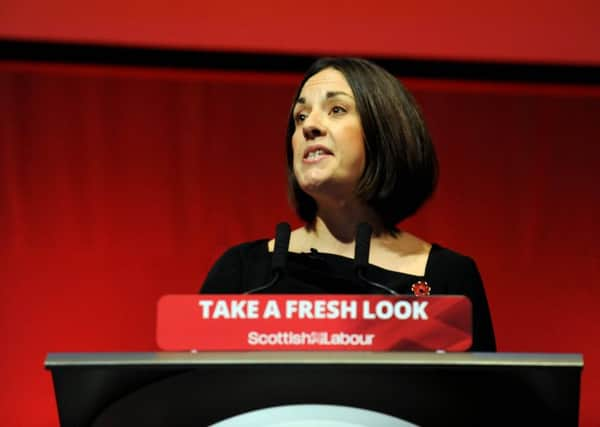Daniel Kenealy: Up to Kezia Dugdale to turn SNP tide


Many believe Corbyn’s election should turn the tide for Scottish Labour. Its support has collapsed since the referendum. The electorate stopped listening to it because while Labour established the Parliament, and emerged as the most powerful force, it did not create a narrative on the purpose of devolution.
It failed to cultivate a reputation for competent government, becoming a “branch office” of a rightward moving British Labour. Working with the Tories in Better Together further alienated many supporters.
Advertisement
Hide AdAdvertisement
Hide AdAll this has meant Scottish Labour is not well placed to challenge the SNP’s ability to “talk” left while introducing few progressive policies in government. Scottish Labour’s challenge goes beyond just regaining the electorate’s ear.
First, it has to regain a reputation for competence – often very difficult for an opposition party. Second, it must convince voters it has sufficient autonomy to do what most believe the SNP does – stand up for Scotland’s interests within Britain. Third, is it has to understand Scottish social attitudes, crafting policy accordingly.
Let’s call it the CAP (competence, autonomy, policy) challenge. Will Corbyn have an impact? Probably less than many think or hope.
On competence, it’s really for Kezia Dugdale and her Holyrood team to do the heavy lifting. If Corbyn continues presiding over a divided Westminster party, he may do a rather bizarre service to Scottish Labour by making it look competent by comparison.
But that is hardly what Labour supporters are hoping for. Dugdale needs to get Scottish Labour focused on recruiting articulate, creative, and ambitious candidates for Holyrood. Ultimately, the perception of competence will return through a mixture of SNP mistakes, new talent, and a clear and coherent message.
On autonomy, Corbyn has said of Dugdale: “She’s the boss”. The greatest service he can do is act as if he means that. Early signs are positive but the work must continue. Yet how the Scottish Policy Forum interacts with the National Policy Forum remains a thorny issue.
And a mechanism has to be found to allow Scottish Labour politicians (including MPs) to back distinctly Scottish Labour policies even on non-devolved issues and even when they contradict the British Labour line. Corbyn needs to recognise this and act accordingly.
On policy, the challenge is greatest because of the interaction between left-wing attitudes and support for independence. By May 2015, 90 per cent of “Yes” voters backed the SNP (about 40 per cent of whom voted Labour in 2010). Winning back those who want independence is a tall order for a unionist party and it’s hard to see how Corbyn can help.
Advertisement
Hide AdAdvertisement
Hide AdBut there is more to the policy challenge than the constitution. Scottish Labour has been outflanked by the SNP on the left, but perhaps not quite in the way that it thinks it has.
Data shows those voting Labour in 2010 then switching to the SNP in 2015 more strongly favour social equality and more think the SNP is the party to deliver it: nearly 75 per cent of those lost voters favour income redistribution and 75 per cent see the SNP as delivering it.
Corbyn can help in the broad sense by making it nigh impossible for the SNP to paint Labour as “Tory-lite”. But the battleground for Scottish Labour now must be Scottish politics and devolved public policy. Scotland is not crying out for socialism.
The notion that Corbyn’s socialism speaks to more in Scotland than elsewhere has little basis. Indeed, it seems that many support the SNP because it makes them feel they are supporting progressive principles without making any sacrifices to that end.
Positioning Scottish Labour must fall to Dugdale, otherwise Scottish Labour fails the autonomy challenge. What Scottish Labour needs is a clear narrative encapsulating SNP policy failures and the case for Scottish Labour.
This could be about the SNP being all style and no substance when it comes to equality and fairness while Scottish Labour is the “real deal”. But that has to be coupled with a new and open policymaking process harnessing the energy uncorked by the independence referendum.
Dr Daniel Kenealy is a lecturer in public policy at the University of Edinburgh. He tweets @DanKenealy. This is an abridged version of his forthcoming article in Scottish Left Review (November-December 2015) www.scottishleftreview.org